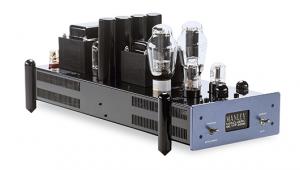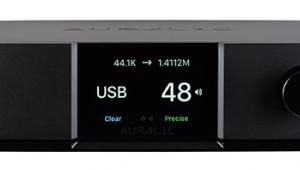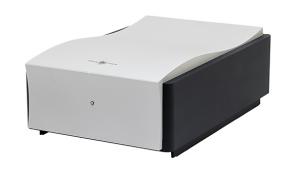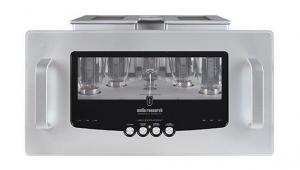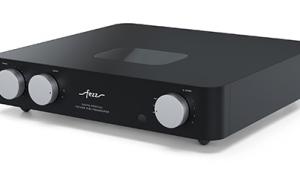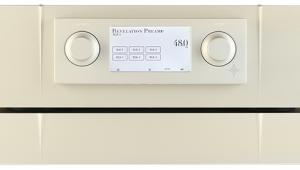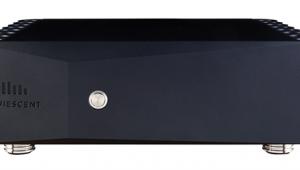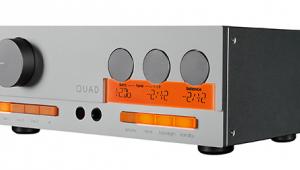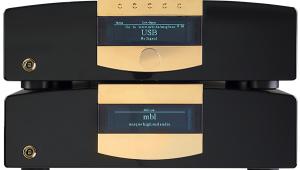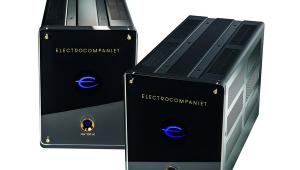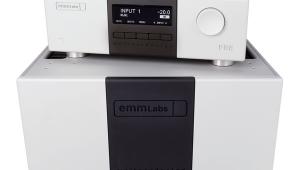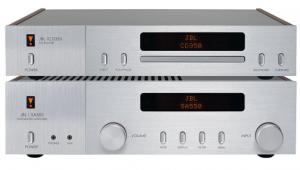Coda Cl/cs (£1450/£2450)
Up to now, Coda Technologies Inc of Sacramento, California, has managed to resist the economic rip-tide which has swept so much audiophile manufacturing towards the Far East. Resolutely continuing to design and build wholly in the US, Coda offers both integrated and pre/power amplification solutions, with prices starting at a point that sits squarely in the territory of the burgeoning Chinese high-end zone.
In terms of build quality, the Coda faces tough competition from the latest Far Eastern products. On construction alone, the CS earns a draw, but the CL’s slightly less than hewn-from-solid casework cedes the initiative to the best competition. However, Coda has one extra card to play: an impressive 10-year warranty, bettered only by the 20-year guarantee offered by the beefcakes at Bryston in Canada.
ENDOWMENT POLICY
In terms of specification, the CS is generously endowed, with a claimed 300W/8ohm, doubling into 4ohm and remaining ‘load-stable’ into 2ohm [see Lab Report]. However, in this skirmish, it’s the CL preamplifier that punches above its weight. Remote control, three single-ended and one balanced line-level inputs, plus tape monitor and processor loops are all thoroughly practical features, but it is the intelligent flexibility of the unit that impresses most.
Both volume and balance are adjustable in 1dB increments via the large dual-mode dial, with all inputs defaulting to a maximum output of unity gain. However, each may be individually adjusted to allow gain of up to 18dB. This function can be used either to match source components with varying output levels or to optimise gain for the user’s chosen power amplifier. While this facility is far from unique, it’s rare in a preamplifier at the CL’s price point, so chalk one up for US value.
At the end of round one, balancing build quality, functionality and claimed performance, the Coda pair yields nothing to the best of the Far-Eastern manufactured competition – impressive given Californian labour and infrastructure costs. Sound has to be the deciding factor, so on to round two.
GOING WELL
In deference to the all-US construction, a wholly US listening programme seemed appropriate, so where better to start than the Deep South, with Lynyrd Skynyrd’s 1972 debut Pronounced. ‘I Ain’t the One’ was a model of clarity and refined energy, with the band’s signature Southern swagger fairly bursting through the speakers. Both vocals and instruments had solid in-room presence, although it was quite clear that agility, dynamics and neutrality were topping the agenda, the sound displaying no trace of excess weight in the form of exaggerated richness or warmth.
Lucinda William’s West provided a marked change of gear. While Skynyrd’s rambunctious energy is fully lo-fi friendly, West only really blossoms through genuinely high quality kit. The Coda pairing duly revealed a fine sense of acoustic space, with Lucinda’s alluring Southern drawl providing a clearly defined yet natural presence in the room. Backing vocals on West are subtle enough to sound a little ephemeral at times, but the CL/CS had sufficient transparency to place them clearly in the mix, and highlight their interplay with the lead.
Moving back to home Californian turf (by way of New Haven, Connecticut) and the altogether gentler appeal of Karen Carpenter, I felt the Codas did not quite transmit the full yearning beauty of the vocals. It was not that the reproduction was not highly satisfying, just that some of the honeyed depths of that amazing voice seemed to remain untapped.
By contrast, on ‘Ticket To Ride’, the sparse genius of Richard Carpenter’s arrangements were handled wonderfully. Here the CL and CS showed an impressive ability to reproduce simultaneously instruments of widely varying timbre, giving each its correct weighting and scale without, say, the power of a piano obscuring the detail of even the lightest brush of a cymbal or strummed harp.
Moving on to the wildly energetic, the Coda combo was in its element with the manic power of Eels’ Souljacker. Bass was tight yet satisfyingly full, while the pairing’s refusal to add even a modicum of artificial warmth was a positive advantage, providing a manically toe-tapping performance with dynamics entirely free of musical inertia.
ON MESSAGE
A succinct summary of the Codas would be ‘well-sorted solid-state’, the pairing providing a refreshingly lucid sound, majoring on neutrality without ever losing touch with the musical message. In terms of top-to-bottom balance they were hard to fault, with low, midrange and high frequencies all erring ever so slightly towards the lean, but without displaying even a vestige of harshness or edge. If I felt there was a slight lack of ‘soul’ in the midrange, any limitations with the most intimate vocal works were compensated for by the units’ dynamics and unerring levels of refinement.
In terms of system building, my own feeling is that a slightly rich or warm source makes a best match, while the CS offers enough power to drive all but the most recalcitrant of real-world speakers. If the CL preamplifier is not quite the most transparent performer at its price, it offers a genuinely impressive balance of performance against functionality. I’m a hair-shirt minimalism man at heart, but felt that every feature of the CL was both useful and, more importantly, would genuinely contribute to the ownership experience. So, well worth an audition.
VERDICT
This US designed and built pre/power combination offers good value, real-world power and genuinely useful functionality. The sonic signature is pure and refined, if erring slightly towards the lean. Great where musical agility and energy are required, but those who like to sink their ears into all-enveloping warmth might be better served elsewhere.
Originally published in the June 2008 issue





